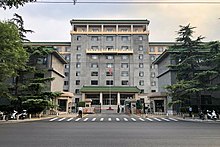National Development and Reform Commission
| 中华人民共和国国家发展和改革委员会 Zhōnghuá Rénmín Gònghéguó Guójiā Fāzhǎn hé Gǎigé Wěiyuánhuì | |
 | |
 Headquarters of the NDRC | |
| Agency overview | |
|---|---|
| Formed | March, 2003 |
| Preceding agencies |
|
| Type | Constituent Department of the State Council (cabinet-level) |
| Jurisdiction | |
| Headquarters | Beijing |
| Employees | 890 |
| Minister responsible |
|
| Parent agency | State Council |
| Website | en |
| National Development and Reform Commission | |||
|---|---|---|---|
| Simplified Chinese | 国家发展和改革委员会 | ||
| Traditional Chinese | 國家發展和改革委員會 | ||
| Literal meaning | State Development and Reform Commission | ||
| |||
| Commonly abbreviated as | |||
| Simplified Chinese | 发改委 | ||
| Traditional Chinese | 發改委 | ||
| Literal meaning | Develop-Reform-Commission | ||
| |||
Politics of China |
|---|
 |
|
The National Development and Reform Commission of the People's Republic of China (NDRC), formerly State Planning Commission and State Development Planning Commission, is a macroeconomic management agency under the State Council, which has broad administrative and planning control over the economy of Mainland China. It has reputation of being the "mini-state council".[2]
The candidate for the chairperson of the NDRC is nominated by the Premier of the People's Republic of China and approved by the National People's Congress. Since February 2017 the commission has been headed by He Lifeng.
Synopsis[]
The NDRC's functions are to study and formulate policies for economic and social development, maintain the balance of economic development, and to guide restructuring of the economic system of Mainland China.[1] The NDRC has twenty-six functional departments/bureaus/offices with an authorized staff size of 890 civil servants. Prior to 2018, it was also responsible for enforcing China's antitrust law, but this function has been transferred to the State Administration for Market Regulation.
The NDRC is one of the main government agencies responsible for data collection for the Chinese Social Credit System.[3]
On 19 December 2020, the NDRC published rules for reviewing foreign investment on national security grounds.[4][5] The rules allow government agencies "to preview, deny and punish foreign investment activities in areas that are deemed as important to national security."[5]
List of Ministers in charge of the Commission[]
This section needs additional citations for verification. (July 2017) |
| No. | Name | Office | Took office | Left office | Premier |
|---|---|---|---|---|---|
| 1 | Gao Gang | Chairman of the Central People's Government State Planning Commission |
November 1952 | August 1954 | Independent of the Premier Zhou Enlai |
| 2 | Li Fuchun | Minister in charge of the State Planning Commission |
September 1954 | January 1975 | Zhou Enlai |
| 3 | Yu Qiuli | January 1975 | August 1980 | Zhou Enlai Hua Guofeng | |
| 4 | Yao Yilin | August 1980 | June 1983 | Zhao Ziyang | |
| 5 | Song Ping | June 1983 | June 1987 | Zhao Ziyang | |
| 6 | Yao Yilin | June 1987 | December 1989 | Zhao Ziyang Li Peng | |
| 7 | Zou Jiahua | December 1989 | March 1993 | Li Peng | |
| 8 | Chen Jinhua | March 1993 | March 1998 | Li Peng | |
| 9 | Zeng Peiyan | Minister in charge of the State Development Planning Commission |
March 1998 | March 2003 | Zhu Rongji |
| 10 | Ma Kai | Minister in charge of the National Development and Reform Commission |
March 2003 | March 2008 | Wen Jiabao |
| 11 | Zhang Ping | March 2008 | 16 March 2013 | Wen Jiabao | |
| 12 | Xu Shaoshi | 16 March 2013 | 24 February 2017 | Li Keqiang | |
| 13 | He Lifeng | 24 February 2017 | Incumbent | Li Keqiang |
Current Leadership[]
- Chairman
- He Lifeng - Vice Chairman of the CPPCC National Committee (sub-state level national leader)
- Vice Chairmen
- Mu Hong - Minister level, Deputy General Office chief of the Central Leading Group for Comprehensively Deepening Reforms
- Zhang Yong - Minister level
- Ning Jizhe - Minister level
- (连维良)
- (林念修)
- (胡祖才)
- Luo Wen (罗文)[1]
Agencies[]
National Energy Administration[]
NEA was established in August 2008, replacing the National Energy Bureau (NEB; 国家能源局) which attempted to reform China's highly dispersed energy management.[6]
See also[]
- China Compulsory Certificate
- Economy of China
- Energy in China (category)
- Gosplan
- Number 10 Policy Unit
- State Information Center
References[]
- ^ Jump up to: a b c "中华人民共和国国家发展和改革委员会".
- ^ Woodall, Brian (May 29, 2014). "The Development of China's Developmental State: Environmental Challenges and Stages of Growth". China Research Center. Retrieved June 2, 2019.
- ^ Liang & al. (2018). "Constructing a Data-Driven Society: China's Social Credit System as a State Surveillance Infrastructure". Policy & Internet. 10 (4): 415–453. doi:10.1002/poi3.183.
- ^ "China issues national security rules on foreign investment". Reuters. December 19, 2020.
- ^ Jump up to: a b "China Defends National Security Rules for Foreign Investment". Bloomberg News. December 19, 2020.
- ^ Highlights of China's institutional restructuring plan - china.org.cn
External links[]
- National Development and Reform Commission
- Government agencies of China
- Economic development in China
- Energy in China
- Investment promotion agencies
- State Council of the People's Republic of China
- 2003 establishments in China
- Government agencies established in 2003
- Organizations based in Beijing
- International trade
- Foreign relations of China
- Economy of China


